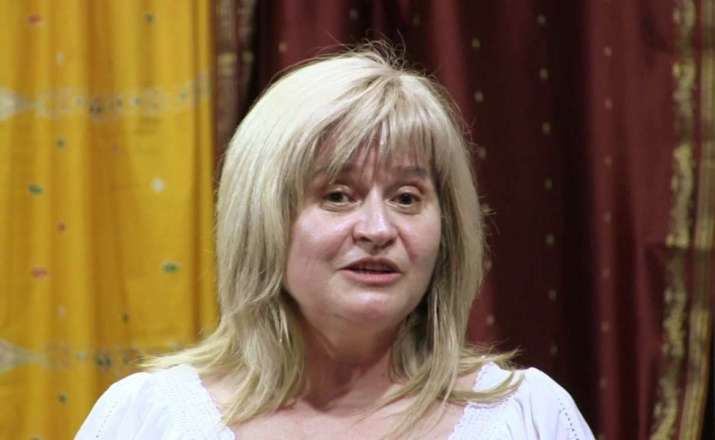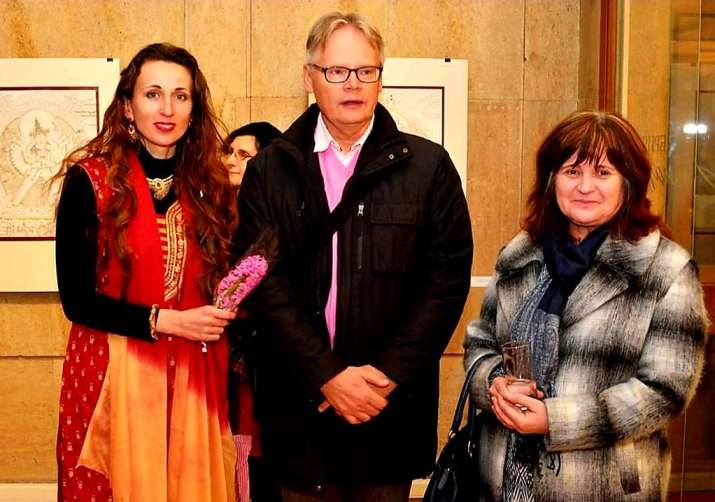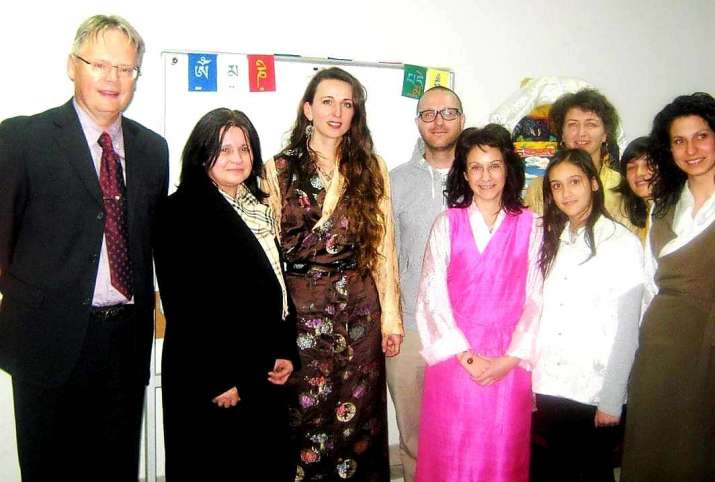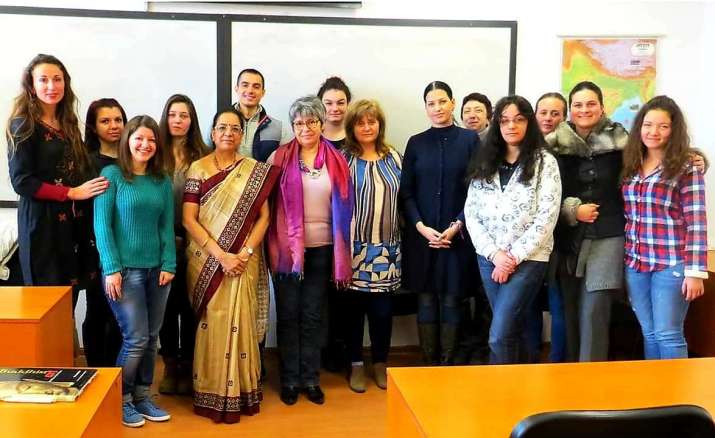
The wisdom of Shakyamuni, the Sage of the Shakyas, is spreading through the centuries across diverse corners of the world. The Sage (muni, from Skt. “sage, one who has taken a vow of silence”), who discovered the truth of existence through self-realization, responded to certain questions about reality with the so-called “Noble Silence.” The echo of his silence resonates up to the present day and continues to inspire millions of people.
Echo from the Silence of the Awakened One is the name of a book written by Professor Milena Bratoeva, one of the very few Bulgarians engaged in the academic teaching of Buddhism. The book, published in 2003 by the “East-West” Indological Foundation, consists of translations of six jatakas (stories of the previous births of Gautama Buddha) written by Haribhatta (5th century) from Sanskrit into Bulgarian.
Milena Bratoeva is a Professor of Ancient Indian (Sanskrit) Literature and Culture as well as of Contemporary Hindi Literature at the Sofia University “St. Kliment Ohridski,” Bulgaria. Since 2011, she has been Head of the “Classical East” Department (including Indian Studies, Iranian Studies, and Armenian Studies) at Sofia University.
She received her Ph.D. with research on Haribhatta jatakamala and the genre jatakamala* in the Buddhist narrative literature in Sanskrit. The topic was proposed to her by one of the most prominent experts in the works of the Buddhist author Haribhatta, Prof. Michael Hahn during her specialization at the Philipps University in Marburg, Germany in 1995-96.

Prof. Bratoeva has written numerous publications on topics concerning the jatakas, written in Sanskrit, as well as Buddhist educational traditions and ethics. She has delivered papers on these topics at conferences and seminars in Bulgaria, India, Portugal, the US, and other countries.**
She teaches several courses in the BA and MA Programs in Indian Studies, including a course of lectures on the Buddhist Narrative Literature in Sanskrit.
Buddhistdoor Global interviewed Prof. Bratoeva about the academic teaching of Buddhism in Bulgaria and how Bulgarians perceive the Buddha’s teachings.
Buddhistdoor Global: How did you start the course of lectures on the Buddhist Narrative Literature?
Prof. Milena Bratoeva: I was very attracted to and at the same time challenged by interpretting the jatakas of Haribhatta, which are composed in the style of the Classical Sanskrit Literature (kavya). I am still very thankful to Prof. Hahn for giving me this rare opportunity to get to know the poetic world of this unique poet.
Coming back from the specialization at the Philipps University and being extremely inspired by my work on Haribhatta, I initiated the course of lectures on the Buddhist Narrative Literature in Sanskrit in the MA Program at our Department. I was very satisfied, because it attracted the interest of many students at the Center of Eastern Languages and Cultures of Sofia University at that time. The focus of the course is the noncanonical Buddhist Sanskrit literature, composed mainly in the tradition of Mahayana Buddhism in India and designed to promote Buddhist doctrine among the laymen.
In the course I introduce my students to problems related to the specifics of the content, language, and style of the Buddhist narrative literature in Sanskrit from the viewpoint of their didactic function. We also discuss the main ethical and philosophical doctrines of Indian Mahayana Buddhism, for example the teaching about the six perfections (satparamita), the ten virtues (dashakushala), as well as of the skillfil means (upaya kaushalya), the ten levels of Bodhisattva progress (dashabhumi), the three bodies (trikaya), and so on.

Image courtesy of the author
BDG: How do Bulgarians and especially your students perceive the Buddhist culture?
PMB: In my view the people in Bulgaria generally don’t know very much about the teaching of Buddha and his disciples. But still I am noticing in the recent decades a growing interest toward Buddhism in our country, especially in the circles of intellectuals and artists. For most of the people interested in the Buddhist doctrines and practices, they become a source of a different kind of ethical values and philosophical ideas as well as of new form of spirituality they urgently need. This is particularly clear after the political changes in 1989 when, as a result of radical economic and ideological transformations in the society, there “opened” a huge vacuum of moral, spiritual, and cultural values. Probably one of the most attractive Buddhist values in the contemporary context is that of karuna, the all-embracing compassion of the Enlightened One and of the bodhisattvas, associated with endless generosity (dana) towards all living beings.
As far as the students are concerned, I could say that it is not easy for them to grasp the deep meaning of the Buddha’s teachings and of the other outstanding Buddhist thinkers like Nagarjuna or Vasubandhu. Usually they are most curious to know more about the rebirth and karma doctrine, one of the most puzzling issues for them.
BDG: Very few people in Bulgaria are engaged in academic teaching of Buddhism? What is the reason for that?
PMB: Yes, it is true that there are only a few scholars and professors at Sofia University, as well as at some other universities in Bulgaria, teaching in academic disciplines concerning different aspects of Buddhism and its manifold schools and branches across Asia. One of the most distinguished was Prof. Alexander Fedotoff (1956-2018), who suddenly passed away last year, an enormous loss that we have yet to overcome.
It is difficult for me to point out all of the reasons underlying this situation in the Bulgarian academic institutions, keeping in mind that Buddhist studies in the other European countries have a long and firm tradition. I guess one serious reason could be the fact that, despite the growing interest in some schools and branches of Buddhism (mainly Tibetan), Buddhism isn’t as popular in Bulgaria as it is in other countries in Europe, America, etc. Additionaly, we don’t have any real Buddhist community here. There are, in my view, some historical reasons too, connected with the relatively late establishment of Oriental Studies in Bulgaria (barely in the academic year 1983-84) at Sofia University. Nonetheless, I like to mention that one of the very first Bulgarian scholars and university professors interested in Sanskrit literature and culture, academic Michael Arnaudov (1878-1978), published in 1900-1902 his remarkable and still valuable research work, entitled Buddha and Buddhism with View on the Indian Religion Before Him.***

BDG: Do you plan to launch any accademic programs related to Buddhism at Sofia University?
PMB: I am very interested in launching an MA program focused on Buddhism at our department. I discussed my idea with some colleagues and they are also ready to be involved in the process of its establishing. I strongly believe that it will be possible to start it in the next academic year. But in order to make this initiative successful, the most important thing is to carefully think over its strategy and target. We have to keep in mind that it should be shaped in such a way that it will be attractive for young people and also give them good opportunities, after graduating, to realize themselves professionally.
* Jatakamala or Garland of Stories are a voluminous body of Indian literature concerning the previous births of Gautama Buddha in both human and animal form.
** Some major of her publications are:
– An attempt to read a Sanskrit jātaka from the viewpoint of the rasa-theory
– Haribhaṭṭas Śaśajātaka (Legende von dem Hasen)
– Echo from the Silence of the Awakened One. From the Garland of Buddha Legends of Haribhaṭṭa. Translation from Sanskrit into Bulgarian of six jātakas of Haribhaṭṭa
-The Metaphor of the Sacrificed Body in the Buddhist Sanskrit Literature from the Viewpoint of Vedic Puruṣa
-The motif of bodhisattva’s self-sacrifice in Haribhaṭṭajātakamālā from the perspective of concept of upāyakauśalya
-Daśakuśala: on the psychology of the moral conduct in Mahāyāna Buddhism (according to Āryaśūra’s “Pāramitāsamāsa”)
*** This is an article published in 1902 in the magazine Misal, which means A Thought. In Bulgarian: Арнаудов 1902: М. Арнаудов. Буда и будизмът. С поглед върху индийската религия преди него. – В: Михаил Арнаудов. – Мисъл, год. 12, № 1, 2, 3, 4, 5, 1902.














